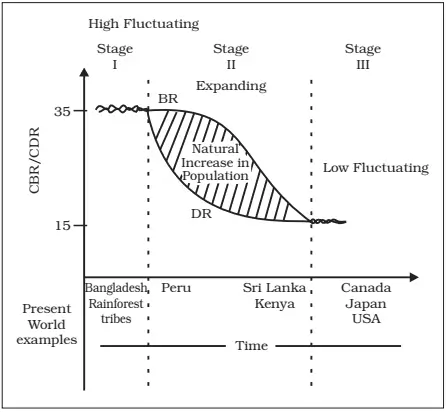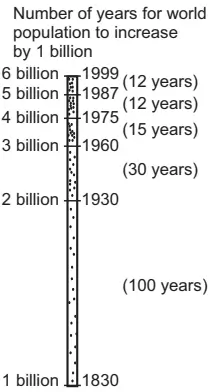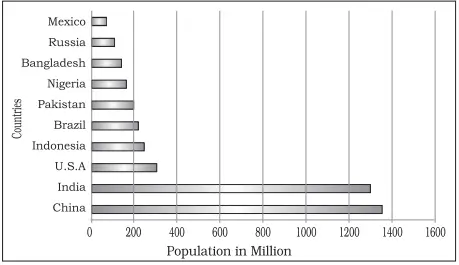Case Study Questions for Class 12 Geography Book 1 - Chapter 2 The World Population Distribution, Density and Growth
Case Study Questions / Source Based Questions
Case Study Question 01
Read the case study given below and answer the questions that follow:
A small increase in population is desirable in a growing economy. However, population growth beyond a certain level led to problems. Of these the depletion of resources is the most serious. Population decline is also a matter of concern. It indicates that resources that had supported a population earlier are now insufficient to maintain the population. The deadly HIV/ AIDS epidemics in Africa and some parts of the Commonwealth of Independent States (CIS) and Asia have pushed up death rates and reduced average life expectancy. This has slowed down population growth.
(i) What is the correlation between population economy?
(A) High population growth leads to high economic growth
(B) High population growth leads to limited economic growth
(C) Less population growth leads to exponential economic growth
(D) None of the Above
Answer
(B) High population growth leads to limited economic growth
(ii) Population decline is a matter of ________.
(A) happiness
(B) concern
(C) economic growth
(D) independency
Answer
(B) concern
(iii) What has slowed down population growth in some countries of Africa?
(A) Malaria
(B) HIV/AIDS
(C) diarrhoea
(D) waterborne disease
Answer
(B) HIV/AIDS
Case Study Question 02
Study the given graph carefully and answer the following questions:
(i) How does the natural increase in population occur as per the graph?
(a) Birth Rate – Death Rate
(b) Death Rate + Birth Rate
(c) Growth Rate- Birth Rate
(d) Birth Rate + Migration
Answer
(a) Birth Rate – Death Rate
(ii) What does the transition from high fluctuating stage to low fluctuating stage indicate?
(a) Shift from Urban Industrial economy to Rural Agrarian economy
(b) Shift from Rural Agrarian economy to Urban Industrial economy
(c) Low Birth and Death Rate to High Birth and Death Rate
(d) Migration from Urban to Rural areas
Answer
(b) Shift from Rural Agrarian economy to urban Industrial economy
(iii) From the given graph, what condition can you infer about the developing countries?
(a) High Birth Rate and High Death Rate
(b) Low Birth rate and Low Death rate
(c) High Birth Rate and Low Birth Rate
(d) Low Birth Rate and High Death Rate
Answer
(a) High Birth Rate and High Death Rate
(iv) In which stage of Demographic Transition, population explosion took place:
(a) Stage- I
(b) Stage- II
(c) Stage- III
(d) Post Stage- III
Answer
(b) Stage II
(v) Which one of the following countries is at the stage I?
(a) Peru
(b) Bangladesh
(c) Japan
(d) Canada
Answer
(b) Bangladesh
(vi) In which stage population explosion can happen?
(a) Stage – I
(b) Stage-II
(c) Stage-III
(d) When the literacy of the society becomes high
Answer
(b) Stage-II
Case Study Question 03
Study the given graph carefully and answer the following questions:
(a) USA
(b) China
(c) India
(d) Both (b) and (c)
Answer
(d) Both (b) and (c)
(ii) Which of the given country has the third highest population in the world?
(a) Brazil
(b) USA
(c) Indonesia
(d) Pakistan
Answer
(b) USA
(iii) How many top ten populous countries are located in Asia?
(a) Six
(b) Four
(c) Nine
(d) Two
Answer
(a) Six
(iv) Name the Africa country that is included in the top ten most populous countries?
(a) Mexico
(b) Nigeria
(c) Brazil
(d) Indonesia
Answer
(b) Nigeria
Case Study Question 04
Study the given graph given above carefully and answer the following questions:
(a) 25 years
(b) 50 years
(c) 75 years
(d) 100 years
Answer
(d) 100 years
(ii) The doubling of population was achieved in the shortest period during which of the following phases?
(a) 1 billion to 2 billion
(b) 2 billion to 3 billion
(c) 3 billion to 4 billion
(d) 4 billion to 5 billion
Answer
(d) 4 billion to 5 billion
(iii) How many years it took for the population to grow from 3 billion to 4 billion?
(a) 5 years
(b) 10 years
(c) 15 years
(d) 20 years
Answer
(c) 15 years
(iv) How many years it took for the population to grow from 2 billion to 3 billion?
(a) 10 years
(b) 20 years
(c) 30 years
(d) 40 years
Answer
(c) 30 years





